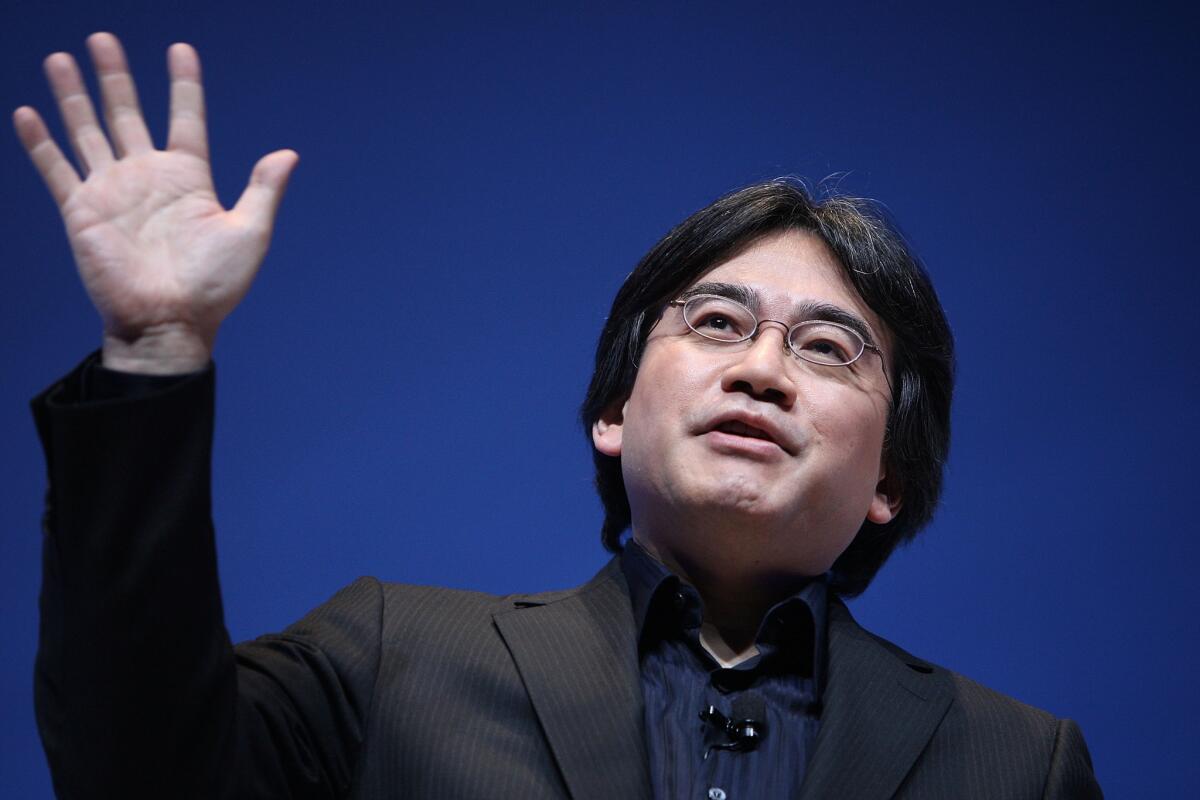Nintendo’s Satoru Iwata dies at 55; under him, Wii created hordes of new gamers

Satoru Iwata held the reins of Nintendo during the launch of two of its most successful gaming consoles: the handheld Nintendo DS and Nintendo Wii home system.
- Share via
Nintendo President Satoru Iwata, who had led the company since 2002 and presided over the launch of the monumentally successful Wii video game console, died Saturday. He was 55.
Nintendo announced Iwata’s death with a brief statement Sunday, saying he had died due to a bile duct growth.
Known to be in ill health, Iwata had skipped North America’s largest video game trade show, the Electronic Entertainment Expo, for the last two years.
Iwata was named director of Nintendo’s operations in June 2000. He assumed the role of president of the Kyoto, Japan-based company in May 2002, after the retirement of Hiroshi Yamauchi, a descendant of Nintendo’s founding family. Yamauchi ran Nintendo for 52 years and died in 2013.
Iwata held the reins of the company during the launch of two of its most successful gaming consoles, the handheld Nintendo DS and the Nintendo Wii home system. The Wii was released in 2006 and has sold more than 101 million units worldwide.
Born Dec. 6, 1959, in Sapporo, Japan, Iwata was the son of a politician who was a municipal mayor.
He became interested in video game programming as a teenager, fashioning simple games on his calculator.
While studying computer science at the Tokyo Institute of Technology, he took a part-time job as a programmer at HAL Laboratories, focusing on development of games such as the Kirby series. After his graduation in 1982, he worked full-time on game development for HAL and did contract work for Nintendo.
When HAL Laboratories verged toward bankruptcy in 1992, Iwata was made the company’s president, and he helped restore it to fiscal soundness. He left in 2000 to become head of corporate planning at Nintendo.
Shortly before Iwata became Nintendo president in 2002, the company launched what became one of its bigger flops: the GameCube console, a successor to the Nintendo 64. The GameCube failed to outsell Sony’s PlayStation 2 and Microsoft’s Xbox, compelling Nintendo to rethink its direction.
Enter the Wii.
The Wii was instrumental in ushering in the modern era of casual gaming, as it was heavily based on motion controls and family-centric entertainment. The system, as well as Iwata’s corporate mandate, was drastically different from those of Nintendo’s competitors in the home video game console business.
Rather than focusing on technological achievements or becoming an all-in-one home media center, the Wii broadened the audience by enabling just about anyone to easily pick up and play a game. Games such as “Wii Sports,” which lets people play virtual tennis with the wave of an arm, captivated the public.
In an opinion piece Iwata wrote for The Times in 2006, he argued that the game industry was becoming too closed-off to new consumers. He wrote that the industry should worry less about graphical enhancements and high-tech wizardry and instead look for ways to enhance “the emotional ways people interact with our games.”
“Like Hollywood, which in the past has focused too heavily on special effects, we need to find other ways to improve,” Iwata wrote.
“The challenge for our industry is to also find ways that improve the experience by means other than what is seen. That shouldn’t be too hard, because we operate interactively, rather than within the restraints of passive storytelling.”
In 2011, poor sales led Nintendo to its first operating loss ever. Shaken, Iwata cut his own salary by 50%.
The follow-up to the Wii, the Wii U, hasn’t been nearly as successful as its predecessor -- it has sold just 9.5 million units since its introduction in 2012. But Nintendo has a follow-up in the works, a project it is referring to as “NX.” Iwata had said more information would be coming on the product in 2016.
Iwata spoke in recent months of further broadening Nintendo’s scope via a pledge “to redefine entertainment as something that improves people’s quality of life,” as he wrote in a message to shareholders last year. He said this would be separate from the company’s video game business and would focus first on a health-orientated theme.
“What Nintendo will try to achieve in the next 10 years is a platform business that improves people’s [quality of life] in enjoyable ways,” he wrote.
Times staff writer Steve Chawkins contributed to this report.
More to Read
The biggest entertainment stories
Get our big stories about Hollywood, film, television, music, arts, culture and more right in your inbox as soon as they publish.
You may occasionally receive promotional content from the Los Angeles Times.









